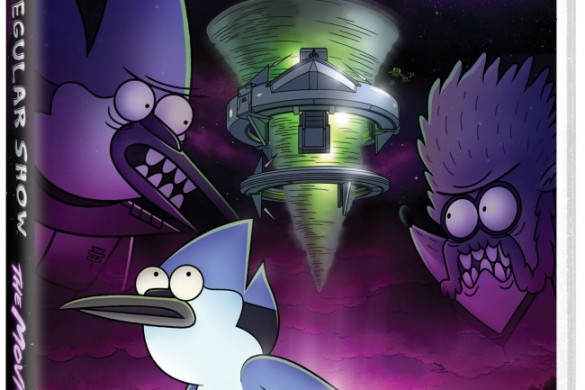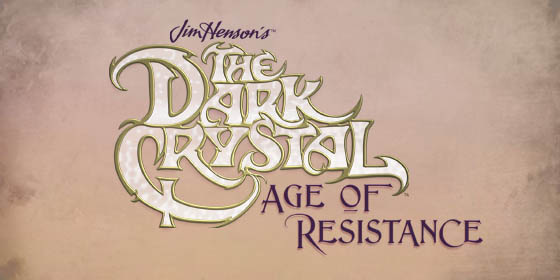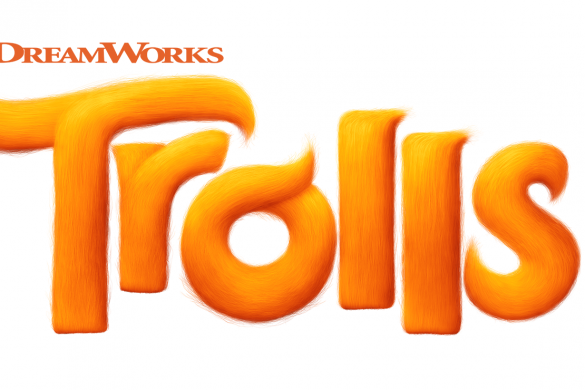Ultraman is a global phenomenon whose legacy is almost as big as his iconic powers to grow. The hero’s franchise has expanded into many television shows, films, comic books, and other media publications to become one of the most notable heroes in the ToHo Kaiju genre. Most of the recent iterations of the character have found their way to Netflix, where it can get the mainstream recognition it deserves. And now the streaming giant’s “Ultraman Rising” paves the way to portray the Japan’s biggest hero into a father. A father of a kaiju that is.
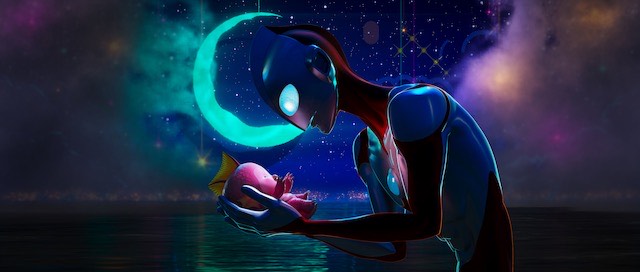
In the age of superhero movies, it’s most easy to overlook someone like an Ultraman, considering she doesn’t have the same following as a Spider-Man, Wolverine, or any of the heroes on the Avengers. Then there’s Superman, Batman, Wonder Woman. And yet, Japan’s most iconic superhero has a cult following. His fans know the stance to grow, the arm formation for his final attack, and the kaijus that he’s faced throughout the 60-year run. And when someone like director Shannon Tindle and co-director John Aoshima comes around to remind us that these heroes we look up to are more than their powers, that they are just as flawed, and have their physical and emotional vulnerabilities, fans can instantly connect because they see them being just as human are they are. And by bringing cultural specificities into the picture, those who have been marginalized can see themselves. What’s more, it also brings an overseas hero and makes them mainstream so that audiences who may not be familiar with the giant hero can finally see why others adore him.
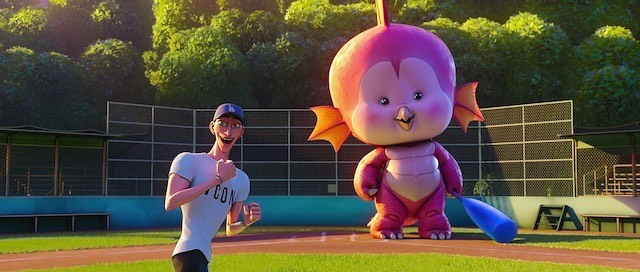
Set in modern-day Japan, a young Kenji Sato (Christopher Sean) is a baseball superstar who left a promising career with the Dodgers to play for the Giants in Japan. Though many sports journalists questioned the move, Kenji, who goes by Ken, relocated back home after his mother took him to America at a young age not because he wanted to but because he had to take the mantle of Ultraman from his aging father, Professor Sato (Gedde Wantanabe). In Ultraman Rising, Ultraman operates as an independent agent who responds to Kaiju threats peacefully as opposed to the KDF who responds with lethal force. Though most would like to have the life of being a superhero and be a baseball all-star, Ken is clearly having trouble adjusting to both. His career as an MLB player is questioned because the Japanese have a different style of play. He also carries the weight of his childhood trauma with him as he speaks candidly about being made fun of for the way he talked, looked, and ate when he was a kid in America.
Ken is feeling the pressures of having a dual life as his performance is starting to slump and he is failing to live up to the expectations of being Ultraman. One battle between himself and a Kaiju nearly leveled a city, leaving citizens unhappy with their once beloved hero. Rather than learn from his mistakes, Ken seeks refuge in his home and asks his AI robot Mina (Tamlyn Tomita) to project old footage of his supportive mother Emiko (also Tamlyn Tomita) cheering him on when he was a child and telling him she will always be there for him despite playing for a rival team. She also is proud of the sacrifices her son had to make returning home to be the new Ultraman and hopes he and his father could find balance – a theme that echoes throughout the film.
As Ken tries to juggle two major responsibilities simultaneously, our hero suddenly finds himself thrust into the role of father when he brings home an infant Gigantron kaiju. Seemingly out of his depth, Ken brings the kaiju home and almost treats it as a pet. Given his arrogance and attitude, he doesn’t want any of the responsibilities to take care of it. Mina lectures Ken that the infant Kaiju will die without proper care and informs him that she will do the best she can to help him but ultimately the infant’s health and well-being falls on Ken. Together, they develop a strategy for feeding her, washing her, and taking her to the potty. Ken’s shocked reaction to the fact that he has to learn how to swaddle, side, shush, swing and suck is priceless and brings a few laughs.
While balance is one of the major themes of “Ultraman Rising,” the film also reminds its audience about parents’ choices and sacrifices so that their children don’t have to repeat them or be burdened with theirs. In the film, we see how Ken blames his father for choosing to be Ultraman and fighting monsters over being with them. Soon, Ken begins to see how his struggles parallel with the choices that his father had to make. What was once a burden to be a hero because his aging father could not should the physical demands, now is a sudden realization that there’s so much more than the suit, the power, and fighting monsters. Underneath that silver and red suit, is a flawed human who has vulnerabilities who also has things they have to protect.
Sure, the threat of kaijus trampling a city brings plenty of stakes to the film, but “Ultraman Rising” grounds itself through its human story. The beautiful parent and child story viewed through the lens of the tokusatsu and kaiju lens has emotional depth. And it also helps that the film is visually stunning when it comes to the action sequences and undeniablly cute when Ken starts to connect with his baby Kaiju. Watching Emi emulate what her adoptive tokusatsu father does like swinging a baseball bat or jump up and down is so joyful and heartwarming that it brings a smile to your face or a tear to your eye, especially if you are a parent or on the verge of becoming one.
Ken’s evolution as a father is so touching to watch because directors Shannon Tindle and John Aoshim doesn’t portray the relationship through rose-colored glasses. They raise the stakes and find a way for an estranged son and an absent Prof. Sato to reconnect. When the infant Kaiju becomes severely injuried after accidentally getting loose from Ken’s home, a desperate Ken pleads with his father to help him. Ken isn’t looking for complaints, guilt, or criticism, he just needs help from someone he can trust. It’s a touching display of a son coming to a father in a time of need. While Ken’s concern over the Kaiju is heartwrenching, Prof. Sato provides a parental balance to the chaos of what happens during a crisis that few have experienced. Though Ken sees Prof. Sato as someone who prioritized being a heron over being a father, Prof. Sato has never gotten what its like to be a father. So in an effort to connect with the infant Kaiju and honor his wife and the mother of Ken, he names the pink winged baby lizard, Emi. And as a father, he knows just what to do to calm Emi down as he uses lullabies and a bunny plushy to distract her.
At the center of “Ultraman Rising” is this idea of what it means to be a parent and discover all of the responsibilities that come with it, including making the tough choices that a child may not like or understand. Even with all of the monsters and a tragic villain like Dr. Onda (Keone Young), who is the antithesis of a father losing his family to the life of coexisting with Kajius, the film never loses sight of its themes. It ties the narrative into the visuals and action sequences to create a heartfelt spectacle. The way a film like this explores the complexities and nuances familiar familial themes with such clarity and humor makes a wonderful watch. And it also introduces a global hero to audiences who those who may not know the person behind the red and silver suit.
This review would be remiss if it didn’t mention the beautiful blend of different 2D and 3D animation styles and nods to anime, manga, and the tokusatsu in this one film alone. Like “Spider-Man: Across the Spider-Verse,” and “Puss in Boots: The Last Wish,” “Ultraman Rising” uses anime-style motion lines to bring more dynamic energy to the action sequences. You can feel what is at stake as Ken, in his Ultraman form, is throwing a punch. Even when Ken teaches Emi how to play baseball, you can see the impact lines when she hits a home run. There’s also less of an emphasis on photorealistic animation, which allows every visual aspect of the film to be more expressive and playful. And the shaky camera brings more life to the animated film as it establishes how the smallest kaiju can make the earth shake.
“Ultraman Rising” strikes a balance between paying tribute to an iconic superhero and telling a wholly original tale that resonates with a global audience and still has cultural specificities to emphasize the importance of representation. It has fun putting a twist on the genre by reimaging a hero fighting giant kaiju into a dad who has to take care of an infant one. The film views the parent and child relationship through the tokusatsu and kaiju lens while using anime and manga artistry to illustrate the visuals. The amusing dynamic and playful juxtaposition between these Ultraman and the Kaiju, or Ken and his father, comes through in the voices as well. Sean, Tomita, Wantanabe bring even more emotional depth through their nuanced voice work as you can feel all of the joys and pains of parenting throughout the film. If anything, a film like this will give us a greater appreciation for what parents have to sacrifice, that they are capable of making mistakes, and that we are all continuing to learn along the way.
10/10




